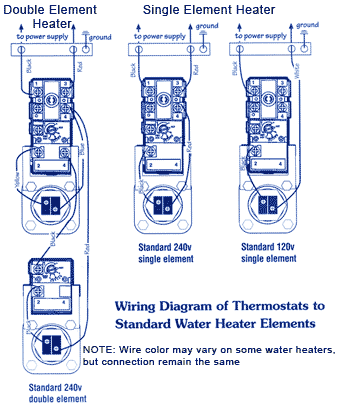Before handling anything on the thermostat use a multimeter to confirm the power is off to the water heater.
Test upper thermostat electric water heater.
Use the screwdriver to set the lower thermostat to the highest setting.
In this case also check the current at the high limit switch.
If you want to test a thermostat on an electric water heater you will also need to check the heating element.
The reading on the multimeter should be zero.
Test the water heater thermostat.
Leave the upper thermostat in the lowest setting and test the lower thermostat.
Check the power supply of the thermostat.
And when it comes to thermostats the device uses two of them generally.
The lower thermostat has only two terminals.
If the water is hot enough at appointed temperature the meter won t show reading.
Before you proceed further with the process of testing the heater thermostat take a screwdriver and the multimeter.
To look for faults you will need to use a screwdriver.
If you get the reading of 240v on terminal 1 and terminal 3 then the power is on but if you get no readings then the power is off.
While the other is found right on the bottom.
The structure of an electric water heater is pretty simple.
Your water heater usually has two elements and two thermostats.
Testing the water heater thermostat involves the checking of the heating element also.
You will also need to check the water heater thermostat with digital multimeter tools.
If the water is cold the multimeter will point near zero.
However they do go bad and testing water heater thermostats is still required.
Connect the multimeter pin ends on point 1 2 as shown in the picture below.
Start by checking the thermostat terminals for the supply of power.
If you have a voltage stick you can use that as well.
The meter should read 0.
If the opposite thing happens that means your thermostat has defected.
Touch one probe of the multimeter to each terminal on the lower thermostat.
One should be sitting on the top of unit 1.
First it allows the upper element to heat the water in the top of the tank.
When this water is hot enough it shuts the upper element off.
This is important especially as open and grounded heating elements result in inaccurate tests.

